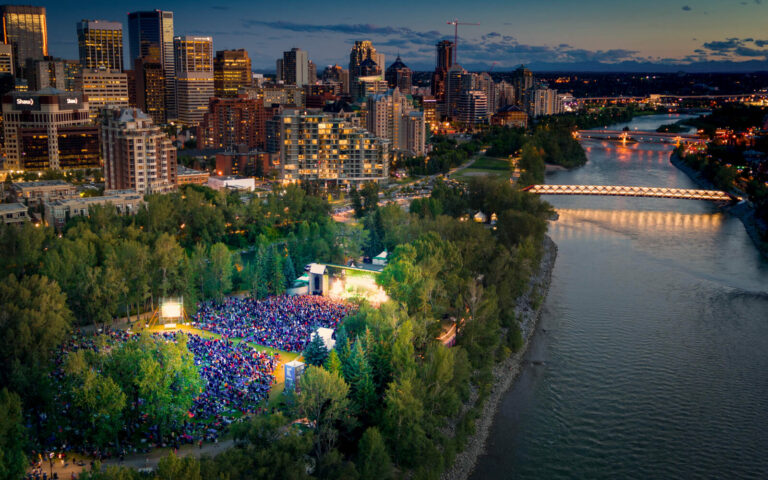By Cam Delisle
On his surprise new album, Montreal's signature super-producer and DJ slips through buttery textures and velvety loops, conjuring a clever mix of body heat and déjà vu.

It’s easy to overlook folk festivals as rote summer traditions that are fun, but ultimately static. The umbrella of folk music stretches way back, each affiliate genre steeped in rich historic and cultural lineages that continue to inform generations of emerging and established musicians. The boundaries of each of these genres are largely well-defined, but tradition necessarily invites tension (family dinners in your 30s, anyone?) as new bodies and voices enter these genres with their own ideas, fresh takes on old styles, and the introduction of new and diverse musical influences.
This is what drives Kerry Clarke, artistic and marketing director for the Calgary Folk Music Festival (CFMF), to consider her role as a post-folk curator of new ideas at the helm of the long-running Calgary summer staple. Operating in the liminal space between tradition and discovery, CFMF boasts a deep lineup each year of familiar faces and brand new names, the latter group standing as one of the unsung elements of the summer festival.
“For me, folk music has always been about singer-songwriters and traditions from all different kinds of cultures and their evolutions,” she says. “What that means is that it’s not always beards and banjos — though beards and banjos can be cool. It’s really original songwriters and traditions and the evolutions of those traditions. We like people to think differently about how they hear songs and how they hear different styles of music.”

A Calgary Folk Music Festival attendee dances while Alvvays performs in 2018. (Photo: Michael Grondin)
That approach to curating each year’s lineup is readily evident as soon as CFMF announces what’s on deck for the summer. This year, among folk giants like Emmylou Harris, Jeff Tweedy and The Sadies, lies a spectrum of more independent artists that are pushing the boundaries of what is possible within traditional elements: Digable Planets infuse slinky, jazzy hip hop into their songwriting, bringing a strong sense of Black culture to a genre that has been historically whitewashed; Fantastic Negrito provides “Black folk music for everyone” with a dizzying blend of funk, gospel, rock, soul and riffs; Aysanabee is an Oji-Cree musician who intersects anthemic, stirring folk stylings with the story of his family and his people’s colonial oppression. Each of these is as unique and diverse as the last, united by an imagined, gossamer thread that is indisputably “folk.” Distilling the genre to its core ultimately suggests a genre of music by and for the people.
“These traditions tend to bounce around,” continues Clarke. “As they go from place to place, they tend to evolve and change. We have the Ryland Moranzes of the world, who is more of a traditional folk artist who has made it his own, but really respects the tradition of the genre. As you uncover it, there are so many artists who take tradition and evolve it in brand new ways.”
At CFMF, tradition and evolution both have their home, semi-neatly divided across the two main stages at the festival. On the largest main stage, the bigger, more recognizable, and perhaps more traditional names play in front of tarpies and newcomers alike. On the Twilight Stage, bookending the island site, discovery artists set their freaky new sounds free on the crowd, who inevitably walk away with a new favourite artist or two each year.
“We have strong independent media in this province with CKUA and CJSW,” Clarke explains of why CFMF is perhaps uniquely positioned to push the boundaries of what a folk music festival can program. “We have a young, hip population in Calgary who are interested in creative, new music. It’s a response to the community. Every festival evolves according to its community and who is doing the booking.”
The term post-folk, then, is perhaps almost a misnomer. How can a music by and of the people evolve as post-anything, when it is continually centred in the communities and traditions that inform these new ideas? It’s just fresh blood, driven by a healthy sense of discovery and a willingness to integrate and influence new sounds into familiar vibes. Traditions are, paradoxically, never static: the very act of structural repetition each year necessarily invites new bodies and new intersections from which new ideas emerge. Folk festivals may not have the underground cultural capital of some of the more independent festivals that fill up the calendar, but it’s guaranteed that you’ll fall in love with something brand new on Prince’s Island this summer.
The 44th annual Calgary Folk Music Festival returns July 27-30 | TICKETS & INFO

Want to read more? Check out our interview with Jeff Tweedy!
By Cam Delisle
On his surprise new album, Montreal's signature super-producer and DJ slips through buttery textures and velvety loops, conjuring a clever mix of body heat and déjà vu.
By Khagan Aslanov
The Boston stalwarts return with another stellar collection of saw-toothed indie rock.
By Melissa Brassard
From Chippy Nonstop to cinematic unions and cyber-goth grooves, the Ottawa multi-arts festival goes all in on the unexpected.